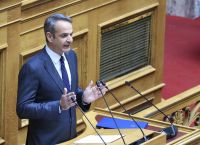US-Backed LNG Mega-Deal: Greece Becomes Europe’s New Energy Gate as Mitsotakis–Zelensky Seal Pact

Πηγή Φωτογραφίας: eurokinissi//US-Backed LNG Mega-Deal: Greece Becomes Europe’s New Energy Gate as Mitsotakis–Zelensky Seal Pact
Greece Steps Into the Center of a New Energy Map
The landmark energy agreement signed between Greece’s DEPA Commercial and Ukraine’s Naftogaz, witnessed by Prime Minister Kyriakos Mitsotakis and President Volodymyr Zelensky, marks a decisive geopolitical shift. The transfer of US LNG to Ukraine through Greek infrastructure is not merely a commercial arrangement—it is a strategic act with regional repercussions stretching from Washington to Kyiv.
“Ukraine will import natural gas from Greece to meet its winter needs,” Zelensky announced ahead of his arrival in Athens, signaling Kyiv’s intent to secure reliable energy flows amid intense pressure on its domestic production from ongoing Russian strikes.
Zelensky has also committed nearly €2 billion to offset production losses and reinforce Ukraine’s energy resilience for the harsh winter ahead.

The American Signal: Kimberly Guilfoyle and the Washington Factor
The presence of US Ambassador Kimberly Guilfoyle at the signing ceremony was deliberate, not ceremonial. It underscored the United States’ strategic vision: Greece is now the central conduit for American LNG into a Europe determined to cut dependence on Russian energy.
“The US supports players who can truly deliver ‘drill baby drill’,” a senior American official commented during last week’s 6th P-TEC meetings in Athens—an unmistakable reference to Greece’s expanding energy capacities.
The message from Washington is clear: Europe’s future gas flows will increasingly pass through Western-aligned routes, not via Russian pipelines—and Greece is the anchor of this new design.
The Vertical Corridor: Greece’s New Diplomatic Weapon
The deal fits neatly into the broader architecture of the Vertical Energy Corridor, which is rapidly transforming Southeast Europe’s energy landscape.
- At Revithoussa, Greece stores LNG imported mainly from the United States.
- In Alexandroupoli, the FSRU converts LNG to gas.
- Through the IGB pipeline, this gas flows toward Eastern Europe and ultimately Ukraine.
This network turns Greece from a simple transit country into a regulator of regional energy flows, granting Athens unprecedented leverage in regional politics.

A Shift in Power
The Mitsotakis–Zelensky agreement, under the de facto umbrella of the United States, generates a new cluster of strategic interests:
- Greece strengthens its position as a stabilizing pillar and energy hub in the Balkans and Southeast Europe.
- Russian influence weakens, as Moscow loses dominance over Ukraine’s and Eastern Europe’s energy supply.
- Ukraine gains a lifeline, securing reliable gas flows as the war continues.
- The US consolidates its role in shaping Europe’s post-Russian energy architecture.
With the Nord Stream pipelines destroyed, the Black Sea infrastructure contested, and European demand still high, Athens emerges as the “safe gateway” for the continent’s new energy reality.
This new Greece–Ukraine LNG agreement is far more than a trade contract. It is a geopolitical milestone that elevates Greece into a strategic energy fulcrum, reinforces Western influence across Eastern Europe, and redraws the balance of power between Washington and Moscow.
Greece is no longer just on the energy map — it is now at its center.
Source: pagenews.gr
Διαβάστε όλες τις τελευταίες Ειδήσεις από την Ελλάδα και τον Κόσμο






Το σχόλιο σας